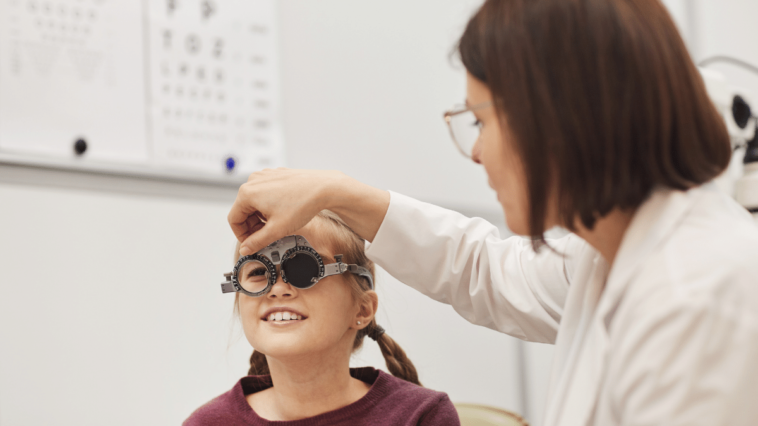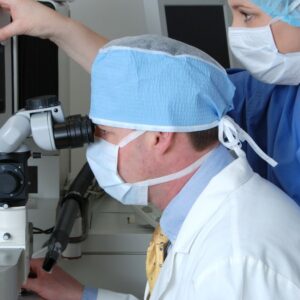What is a Pediatric Ophthalmologist?
A pediatric ophthalmologist is a medical doctor specializing in treating and diagnosing eye problems in children. They have completed a four-year college degree, four years of medical school, and at least three years of additional training in ophthalmology. This specialized training includes diagnosing and treating eye conditions unique to children, such as crossed eyes (strabismus) and lazy eye (amblyopia).
Pediatric ophthalmologists are trained to work with children of all ages, from newborns to teenagers. They can communicate with children in a way that is easy for them to understand and make them feel comfortable during exams and procedures.
Qualifications and Education for a Pediatric Ophthalmologist.
To become a pediatric ophthalmologist, a person must complete several years of education and training. Here is a general overview of the educational and training requirements for this career:
- Bachelor’s degree: A person interested in becoming a pediatric ophthalmologist must earn a bachelor’s degree in a scientific field, such as biology or chemistry.
- Medical school: After completing a bachelor’s degree, a person must attend medical school to earn a medical degree (MD or DO). Medical school typically lasts four years.
- Residency: After completing medical school, a person must complete a three-year residency program in ophthalmology. During this training, the person will learn to diagnose and treat various eye conditions in patients of all ages.
- Fellowship: After completing a residency in ophthalmology, a person can apply to a fellowship program in pediatric ophthalmology. These programs typically last one or two years and provide additional training in diagnosing and treating eye conditions in children.
In addition to completing this education and training, pediatric ophthalmologists must also be licensed to practice medicine in their state. This typically requires passing a licensing exam.
Responsibilities of a Pediatric Ophthalmologist
Pediatric ophthalmologists specialize in providing medical care for children’s eye problems. They diagnose and treat a wide range of conditions. Some of their specific responsibilities may include:
- Examining children’s eyes: Pediatric ophthalmologists use various techniques to examine children’s eyes and assess their overall eye health. This may include using instruments to measure visual acuity and check for eye muscle problems or special dyes to check for abnormalities in the front of the eye.
- Diagnosing eye conditions: Based on the results of these exams, pediatric ophthalmologists may diagnose a variety of eye conditions, such as amblyopia (lazy eye), strabismus (crossed eyes), and refractive errors (problems with the way the eye focuses light).
- Developing treatment plans: Once a diagnosis has been made, pediatric ophthalmologists work with their patients and their families to develop treatment plans that may include eyeglasses, contact lenses, medications, or eye surgery.
- Monitoring patients’ progress: Pediatric ophthalmologists track their patient’s progress over time to ensure that their treatment plans are effective and to make any necessary adjustments.
- Educating patients and families: Pediatric ophthalmologists also play an essential role in educating their patients and their families about eye health and how to care for their eyes. This may include providing information about proper nutrition for eye health, the importance of wearing protective eyewear, and the dangers of eye injuries.
Conditions Treated by a Pediatric Ophthalmologist
Pediatric ophthalmologists specialize in caring for the eyes of infants, children, and adolescents. They are specifically trained to diagnose and treat any and all eye-related diseases or conditions that affect this age group. Some common conditions that a pediatric ophthalmologist may treat include:
- Strabismus (misaligned eyes)
- Amblyopia (lazy eye)
- Refractive errors (nearsightedness, farsightedness, astigmatism)
- Cataracts
- Glaucoma
- Retinopathy of prematurity (ROP)
- Eye injuries
- Inherited eye conditions, such as retinoblastoma or congenital cataracts
- Genetic eye conditions, such as Down syndrome or albinism
Pediatric ophthalmologists work with children of all ages, from newborns to teenagers. They use various techniques to diagnose and treat eye conditions, including exams, visual acuity tests, imaging tests, and surgeries. They may also prescribe eyeglasses, contact lenses, or eye patches to help correct vision problems.
How To Choose The Right Pediatric Ophthalmologist
When it comes to eye care for your child, a pediatric ophthalmologist is often the best choice. Highly trained and qualified in this field of medicine, these specialists possess the experience to assess and diagnose potential issues with your child’s eyes. With their skill and expertise, pediatric ophthalmologists can provide safe and appropriate treatment plans tailored to your child’s needs. Here are some considerations to keep in mind when selecting a pediatric ophthalmologist:
- Recommendations: Ask your child’s pediatrician or other healthcare providers for recommendations on pediatric ophthalmologists in your area. You can also ask friends or family members who have had experience with pediatric eye specialists.
- Training and experience: Look for a pediatric ophthalmologist who has completed specialized training in treating children’s eye conditions. It can also be helpful to choose a specialist who has experience treating children with a specific condition that your child has.
- Location: Consider the location of the pediatric ophthalmologist’s office and whether it is convenient for you and your child to get to appointments.
- Insurance: Check with your insurance provider to see which pediatric ophthalmologists are covered under your plan.
- Personality: Choose a pediatric ophthalmologist who is patient and friendly and can explain complex medical information in a way that is easy for your child to understand. Finding a specialist who makes your child feel comfortable and willing to answer your questions and concerns is also essential.
Before committing to any one eye doctor, we suggest meeting with several to find the best one that fits your child’s needs. Schedule consultations with a few pediatric ophthalmologists and get a sense of who is suitable for your child’s needs.






